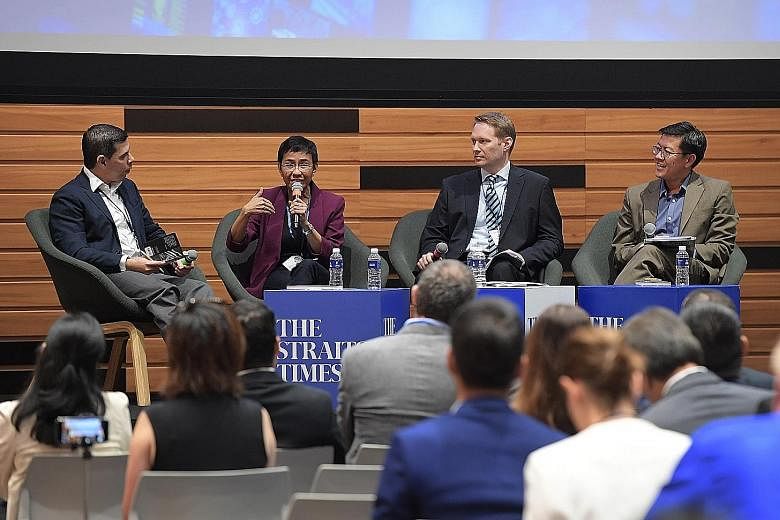The battle against fake news needs to be fought on several fronts.
Home Affairs and Law Minister K. Shanmugam made the point yesterday as he underlined the importance of strengthening media literacy, even as Singapore prepares to introduce new legislation next year to curb fabricated stories.
He, however, felt platforms like Google and Twitter "bear significant responsibility" in tackling inappropriate content, including fake news, while the media plays a key role in being a trusted source of news.
Mr Shanmugam set out these battlefronts in his opening address at a conference on fake news, at which he announced pending laws against such falsehoods. The two-day forum is organised by The Straits Times and the World Association of Newspapers and News Publishers.
To help shape the new laws, Singapore officials visited Germany and Britain. Germany proposed laws in April to punish social networking sites if they do not swiftly remove content such as hate speech or defamatory fake news.
In Britain, a parliamentary committee had been looking into online fake news, and whether new laws should be created to hold social networks responsible for inappropriate content.
But beyond laws, Mr Shanmugam told reporters, "the key is to build a more resilient society, a society that can pick up and understand what is fake".
"In that context, education is extremely important. And also the ability of civil society, people, to respond to fake news," he said.
The Education Ministry and Ministry of Communications and Information will help ramp up media literacy in the population, he added.
For the media, he said it is important to ensure journalism standards are robust as its role as a trusted news source is being challenged.
Meanwhile, firms like Google and Twitter have made a commitment to tackle misinformation, such as by removing hate speech, he added.
But the Government still has a key role to play, he said, noting: "It must stand ready to deal with misinformation that impacts society."
"Echo chambers" online amplify the negative impact of false narratives, and with 91 per cent of Singapore residents surveyed last month supporting stronger laws to remove or correct fake news, legislative action "seems a no-brainer", he said.
Highlighting that misinformation can be used to spread hate or used for profit, Mr Shanmugam stressed that Singapore remains "particularly vulnerable" to foreign influences harnessing fake news for their own ends.
The country also faces the risk of misinformation exploiting racial and religious fault lines, and rumours on social media and communication platforms like WhatsApp that confuse and promote distrust.
"If the distrust becomes deep rooted, people will have serious doubts about institutions, about governance, and you then get a fractured polity," he said.
The need for education and trust was also raised at a panel discussion.
Crucial steps must be taken to educate people and build up trust in the country's media, said Associate Professor Eugene Tan, a Singapore Management University law don.
The panel, on truth and trust in the digital age, was moderated by The Straits Times editor Warren Fernandez, who is also editor-in-chief of the English, Malay and Tamil Media Group at Singapore Press Holdings.
Prof Tan said: "It is important that regulation must not weaken the ability of any society to be able to discern for themselves. Governments cannot do the thinking for the people."
With fake news here to stay, people need to be taught how to react to attempts at misinformation, said the panellists.
"Governments always believe in their ability to do wonders... but we should bear in mind that there are inherent limits to what they can do when it comes to fake news," said Prof Tan.
The two other panellists - Ms Maria A. Ressa, chief executive officer of Manila-based online news site Rappler, and Mr Jason Subler, a managing editor of Reuters - also stressed that governments cannot fight fake news alone. Equipping people with media literacy skills must be a key strategy, they said.
Another tactic is to strengthen confidence in the media, they added, as plummeting trust in traditional media has driven people to look for news on alternative platforms that may carry information that is untrue or erroneous.

